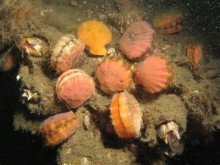In May last year an extensive algal bloom in the Channel caused an ASP *algal toxin problem in scallops with sampling showing levels well above the maximum permitted legal level of 20 mgs of domoic acid (the toxin component) per kg of scallop flesh. Levels dropped throughout 2014 but generally remained above the permitted level.
Weymouth Port Health Authority, working with the Dorset coastal local authorities, Cefas and the Food Standards Agency will continue to carry out background testing of scallops for the presence of toxin in order to keep an over view of the toxin position, however this does not alter the legal duty on fishermen and merchants who place scallops on the market to undertake their own testing on every batch of scallops landed, to ensure that any toxin present is below the max permitted level.
Scallops supplied to catering establishments and for retail sale must be accompanied by a certificate to say that the legal limit for toxin has not been exceeded. Shucked scallops used in catering establishments may only be purchased from an approved shucking establishment where the process has been verified as meeting a safe standard.
Algal blooms typically occur in the spring but can occur at other times as well. Unfortunately, scallops do not easily excrete the toxin once it has been absorbed into the animal. This is why testing of all commercial batches of scallops now has to be routinely undertaken to ensure that they are safe to eat.
Recreational divers and other members of the public are advised that scallops gathered for their own consumption could contain toxins. Discarding the gut and gut membranes (shucking) gives a reasonable measure of safety in respect of ASP toxin as it concentrates in the gut but other types of toxin, if present, may not be so easily removed.
Paul Kimber, Chair of Weymouth Port Health Committee says: “Weymouth PHA officers working with the Cefas Lab will continue to monitor the overall toxin situation in regard to scallops and other filter feeding bivalve molluscs. This is part of a national public health control programme which the authority has been engaged with since the programme started some 15 years ago.”
* ASP (Amnesic Shellfish Poisoning) type toxin can cause neurological symptoms if consumed in sufficient quantity. These symptoms include dizziness, confusion, weakness, possible permanent short term memory loss and in very rare cases, death.
Enquiries to: Weymouth Port Health Authority 01305 838432 or email [email protected]







